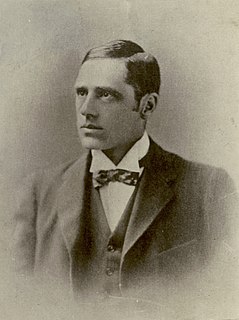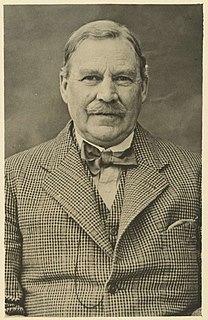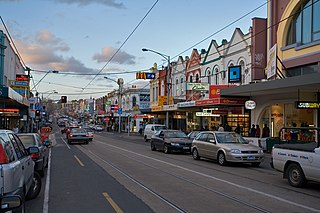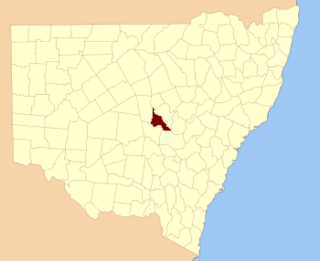| "The Geebung Polo Club" | |
|---|---|
| Author | Banjo Paterson |
| Country | Australia |
| Language | English |
| Published in | The Antipodean |
| Publication type | Periodical |
| Media type | Print (Magazine, Hardback & Paperback) |
| Publication date | 1893 |
| Preceded by | A Bush Christening |
| Followed by | Black Swans |
"The Geebung Polo Club" is a poem by Banjo Paterson, first published in The Antipodean [1] in 1893. It was also included in his first anthology of bush poetry The Man from Snowy River and Other Verses in 1895.

Andrew Barton "Banjo" Paterson, was an Australian bush poet, journalist and author. He wrote many ballads and poems about Australian life, focusing particularly on the rural and outback areas, including the district around Binalong, New South Wales, where he spent much of his childhood. Paterson's more notable poems include "Clancy of the Overflow" (1889), "The Man from Snowy River" (1890) and "Waltzing Matilda" (1895), regarded widely as Australia's unofficial national anthem.
The Antipodean was an annual Australian illustrated literary periodical first published in 1892. It was edited by George Essex Evans in 1892, 1893 and 1897, with co-editors John Tighe Ryan (1892-3) and Banjo Paterson (1897). The publisher was George Robertson & Co..
The Man from Snowy River and Other Verses (1895) is the first collection of poems by Australian poet Banjo Paterson. It was released in hardback by Angus and Robertson in 1895, and features the poet's widely anthologised poems "The Man from Snowy River", "Clancy of the Overflow", "Saltbush Bill" and "The Man from Ironbark". It also contains the poet's first two poems that featured in The Bulletin Debate, a famous dispute in The Bulletin magazine from 1892-93 between Paterson and Henry Lawson.
Contents
It is one of Paterson's best-known poems and combines several of the most frequently recurring characteristics of his poetry - humour, tragedy and horses.
The poem's unnamed narrator clearly admires the rough and ready "Geebung Polo Club", who are contrasted with their wealthy city opponents - "The Cuff and Collar Team".
The only geographic reference in the poem is of the Campaspe River, which flows north through central Victoria to the Murray River.

The Campaspe River, an inland intermittent river of the north–central catchment, part of the Murray-Darling basin, is located in the lower Riverina bioregion and Central Highlands and Wimmera regions of the Australian state of Victoria. The headwaters of the Campaspe River rise on the northern slopes of the Great Dividing Range and descend to flow north into the Murray River, Australia's longest river, near Echuca.

Victoria is a state in south-eastern Australia. Victoria is Australia's most densely populated state and its second-most populous state overall. Most of its population lives concentrated in the area surrounding Port Phillip Bay, which includes the metropolitan area of its state capital and largest city, Melbourne, Australia's second-largest city. Geographically the smallest state on the Australian mainland, Victoria is bordered by Bass Strait and Tasmania to the south, New South Wales to the north, the Tasman Sea to the east, and South Australia to the west.

The Murray River is Australia's longest river, at 2,508 kilometres (1,558 mi) in length. The Murray rises in the Australian Alps, draining the western side of Australia's highest mountains, and then meanders across Australia's inland plains, forming the border between the states of New South Wales and Victoria as it flows to the northwest into South Australia. It turns south at Morgan for its final 315 kilometres (196 mi), reaching the ocean at Lake Alexandrina.
Scottish-Australian bush poet, and acquaintance of Paterson, Will H. Ogilvie penned For the honor of Old England and the glory of the game in 1897. Although similar in nature to Paterson's earlier-written The Geebung Polo Club, Ogilvie's work was written after an actual polo competition in Parkes, New South Wales, involving Harry 'Breaker' Morant and Ogilvie. [2]

Will H. Ogilvie was a Scottish-Australian narrative poet and horseman, jackaroo, and drover, and described as a quiet-spoken handsome Scot of medium height, with a fair moustache and red complexion. He was also known as Will Ogilvie, by the pen names of 'Glenrowan' and the lesser 'Swingle-Bar', and by his initials, WHO.

Polo is a horseback mounted team sport. It is one of the world's oldest known team sports.

Parkes is a town in the Central West region of New South Wales, Australia. It is the main settlement in the local government area of Parkes Shire. Parkes had a population of 11,408 as at 30 June 2016.












